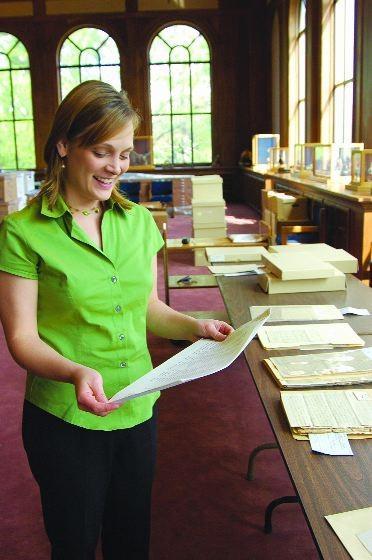Countless manuscripts and documents of seemingly subdued ancient history lie tucked inside the quiet rooms of Hill Memorial Library. But these documents are anything but silent to Carole Salmon, a French studies Ph.D. student, who analyzed thousands of hand-written letters this summer from French-speaking Louisianians in the 18th and 19th centuries.
Salmon selected 105 letters to digitally scan into Hill Memorial Library’s online database. Digitalizing the personal and business-related correspondence will enable researchers to easily sift through years of primary sources from Louisianians.
The first phase of the project – copying the letters word-for-word in French – will begin in August 2006, according to the Center for French and Francophone Studies. The center expects the transcription process will be completed in January 2007.
After the letters are transcribed, Bernard Cerquiglini, the center’s director, will edit and proofread the letters. In January 2007, Elaine Smyth, curator of the Louisiana and Lower Mississippi Valley Collections in Hill Memorial Library, will work with a graduate student from the center to catalog, enter data and design a Web page for the newly-digitalized letters.
Salmon said she hopes this initial project will spur others. The Center for French and Francophone Studies has completed a grant proposal to send to the Louisiana Board of Regents and other cultural conservation organizations to fund this project as well as future projects. The center’s grant proposal also includes the possibility of digitalizing the entire body of French manuscripts in the library and translating the manuscripts from French to English.
Salmon took correspondence from a variety of sources. She said she chose accounts from nuns, soldiers, attorneys and planters – perspectives from all walks of life.
“I was trying to find people from each social class,” Salmon said. “I found love letters, official letters, letters of recommendation … the most important factor was that the letters had to be written in French in Louisiana.”
When the database is completed, students, researchers and others interested in Louisiana’s rich French heritage will be able to access letters such as “Conseuils à mon fils,” a small cloth-covered journal containing a hand-written copy of a letter Suzette Huppe sent her son Bernardin Lafon in 1836. Huppe was related to the Prudhomme family, planters in Natchitoches.
The database will be a resource for researchers in different fields, Salmon said. She used library references recommended by Sylvie Dubois, the chairman of the Department of French Studies, who has done extensive research in French linguistics. Many of the letters include insights into the economy and politics of the time.
“The idea is to build a body of research material,” said Tara Laver, assistant curator for manuscripts. “If three different people were looking for something different, they could all find what they were looking for in the same letter. There is not one use or one interpretation.”
The library’s database will include a biography of the writer and the document word-for-word since some of the documents’ words are smudged with age, Laver said.
Salmon, whose previous studies include a degree in Acadian culture at the Sorbonne Academie in Paris, said she picked a body of manuscripts that embodies Louisiana’s society during the 18th and 19th centuries.
Armand Duplantier, a former owner of Magnolia Mound plantation in Baton Rouge, came to Louisiana right after the French Revolution, Salmon said. Duplantier wrote letters to friends in France about the conditions of post-war France.
Salmon said she noticed patterns as she perused the letters.
“I concentrated on work before 1840, which is considered the big switch to English by intellectuals,” Salmon said. “People started using it less and less. The same people who wrote in French started writing in English after 1840.”
Government officials, many of whom were born and educated in France, wrote most of the letters in the early 18th century, Salmon said. She said she noticed a more distinct female voice during and after the Civil War, while the men were away from home. Women ran their husbands’ businesses and conducted business transactions through correspondence and wrote letters to their husbands.
Salmon said she hopes the initial database will lead to the eventual digitalization of the entire French manuscript collection.
“There are a lot of treasures in Hill Memorial Library that just sleep there,” Salmon said.
Contact Leslie Ziober at [email protected]
Notre l’histoire
October 4, 2005

Tara Laver, assistant librarian in Hill Memorial Library, looks through an assortment of 105 French manuscripts written during the 18th and 19th centuries. The selection ranges from love letters to official business correspondence. All the letters were
Notre l’histoire





